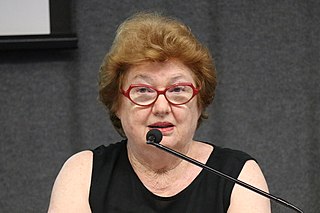
Lygia Fagundes da Silva Telles was a Brazilian novelist and writer. Educated as a lawyer, she began publishing soon after she completed high school and simultaneously worked as a solicitor and writer throughout most of her career. She was a recipient of the Camões Prize, the highest literary award of the Portuguese language and her works have received honors and awards from Brazil, Chile and France. She was elected as the third woman in the Brazilian Academy of Letters in 1985 and held Chair 16.

Maria Lacerda de Moura was a Brazilian teacher, writer and anarcha-feminist. The daughter of spiritist and anti-clerical parents, she grew up in the city of Barbacena, in the interior of Minas Gerais, where she graduated as a teacher at the Escola Normal Municipal de Barbacena and participated in official efforts to tackle social inequality through national literacy campaigns and educational reforms.
Regina Rheda is a Brazilian-born writer who lives in the United States. She is known for her prose fiction concerning urban life, transnational migration, class conflicts, and animal rights. She received a national book award, Prêmio Jabuti, in 1995.

Fayga Perla Ostrower was a Polish-Brazilian engraver, painter, designer, illustrator, art theorist and university professor.

Enrique Ricardo Lewandowski is a Brazilian judge and former justice of the Supreme Federal Court of Brazil. He's the son of a Polish father and Swiss mother, who immigrated to Brazil after the Second World War.

Mariana Coelho was a Portuguese Brazilian educator, essayist and poet, and a feminist pioneer in Brazil.

Aline da Silva Ferreira is a female wrestler from Brazil. She became the 2014 Vice-World Champion in the 75 kg weight class.

Events in the year 2005 in Brazil.
The Trófeu Raça Negra is a Brazilian award which is handed out to individuals and groups who have contributed or exhibited advancements for Afro-Brazilians. Organized by the NGO Afrobras, it was first handed out in 2000 on the 500th anniversary of the European arrival in Brazil, and has been held annually since 2004. It is similar to the NAACP Image Award in the United States.

Aparecida Sueli Carneiro Jacoel, best known as Sueli Carneiro is a Brazilian philosopher, writer and anti-racism activist. Carneiro is the founder and current director of Geledés — Instituto da Mulher Negra and a leading author on black feminism in Brazil.
Sheila Maureen Bisilliat is an English-born Brazilian photographer.

Marie Rennotte was a Belgian-born Brazilian physician, teacher, and women's rights activist. She was active in the fight for women's rights. After earning her teaching credentials in Belgium and France, Rennotte taught for three years in Germany before moving to Brazil as a governess. Giving private lessons and teaching at a girls' school, she lived in Rio de Janeiro from 1878 to 1882. Hired to teach in the State of São Paulo, she moved to Piracicaba where from 1882 to 1889 she taught science, developed the curriculum, and enhanced the reputation of the Colégio Piracicabano. The co-educational school was an innovative institution offering equal education to girls and boys.
The origins of feminism in Brazil trace back to the 19th century. During the Empire of Brazil, some jurists attempted to legalize women's suffrage, with or without the consent of the husband. Later, the republican constitution of 1891 did not exclude women from voting, because they were not considered individuals who could have rights. That made some women request, without success, their inclusion among the voters. The 1891 constitution initially had a clause that gave women the right to vote, but it was abolished in its last version because the idea that politics was not an honorable activity for women prevailed.
Cleonice Serôa da Motta Berardinelli was a Brazilian academic.

Manuela Carneiro da Cunha is a Portuguese-Brazilian anthropologist, who is known for her studies of indigenous people in Brazil.

Goffredo Carlos da Silva Telles or, as he later adopted Gofredo da Silva Telles Júnior was a Brazilian lawyer, jurist, and university professor.

The Diploma Bertha Lutz, also known as the Prêmio Bertha Lutz, was established by the Federal Senate of Brazil to recognize women who have made contributions to the defense of women's rights and gender issues in Brazil. It is named in honor of the Brazilian biologist and feminist leader Bertha Lutz.

Luzia Margareth Rago is a Brazilian historian, researcher of women's studies and feminist. She is a professor at the State University of Campinas, where she has been a lecturer since 2000. Influenced by authors such as Michel Foucault, Gilles Deleuze, Jean-François Lyotard and Jacques Derrida, she seeks to establish a specific methodology for what she calls "feminist science".













